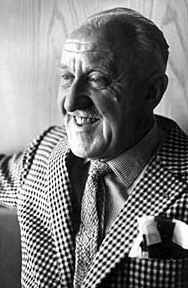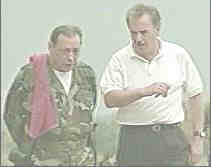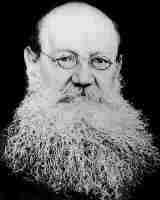^
Deaths which occurred on a February
08:
2004 A US soldier, by a roadside bomb near Mahmudiyah,
Iraq.
2003 John Freddy, 43, at 06:45,
as he tries to buy a cup of coffee at the Central Mini Market at 76~20 Liberty
Avenue in Ozone Park, Queens NY, (Freddy, from Guyana, was the dairy department
manager of the Associated Supermarket across the street), shot in the head
with a .40 caliber revolver (here designated as “0302080310NY”)
by one of two robbers who unsuccessfully try to open the cash register;
and, two hours later, Sukhjit “Sammy” Khajala,
50, born in India, owner and cashier of the Around the Clock Mini Mart deli
at 325 Lafayette Avenue in the Mill Basin section of Brooklyn NY, shot with
the same revolver 0302080310NY, by one of two men who rob $169. On 10 March
2003, the same gun 0302080310NY would be used by a lone gunman to kill Russian
immigrant Albert Kotlyar, the attendant at the Laundry King Superstore at
1384 Atlantic Avenue in Bedford-Stuyvesant, Brooklyn NY, where nothing would
be robbed. After Larme Price, 30, admits on the phone to the police that
he committed these 3 murders, and a 4th (of Muhammad Ali Nassir, on 20 March
2003) out of anger about the 11 September 2001 attack on the World Trade
Center, he is arrested on 29 March 2003.
2003 Shawkat Haji Mushir,
who was a minister of the Kurdish parliament; two senior security
officials, a son of Salih Hassan, Mrs. Fazil, and on000e other person,
assassinated at 21:20 by Ali Tezhia (who shot Mushir) and other Ansar el
Islam militants holding a pretence of defection talks in the house of Salih
Hassan in Garnish Tappah, Iraqi Kurdistan (effectively autonomous since
1991). 12 others are injured, including the Mrs. Fazil's daughter Daroon
Fazil, 8, shot in the forehead, who dies the next day. Ansar el Islam is
an extremist Islamic faction with perhaps 600 fighters which hold a small
area around Beyara near the Iranian border and has been warring against
the Kurdish government since 2001.
2003 James Hoffman,
70, of cancer, Catholic bishop of Toledo, Ohio.
2002 Moran
Amit, 25, Israeli of Kibbutz Kfar Hanasi, after being repeatedly
stabbed by four masked Palestinians aged 14 to 16 while she was strolling
with her boyfriend on the Sherover Promenade in Jerusalem's Armon Hanatziv
neighborhood at about 13:15. Moran Amit was a law student at Haifa University,
and worked for Yedioth Ahronoth's Internet news site, Ynet, managing its
singles forum.
2002 Samar Abu Miala, 14, Israeli
Arab after being arrested by Israeli police, together with three other Israeli
Arab youths (all four from the East Jerusalem neighborhood of Abu Tor),
for the stabbing of Moran Amit (see above). Police say that it appears that
he suffered a heart attack and denied that they hit him. However, an Arab
eyewitness, Adham Jawan of Abu Dis, said he saw police beat the youth and
shoot his hand and foot. The three remaining youths (one of which, Ahmad
Shwaiki) fell wounded by a bullet in the arm) confessed to stabbing Amit
and reenacted the crime for the police. Police said the four had been involved
in a number of attacks in that part of Jerusalem in recent months, including
two attempted stabbings, throwing Molotov cocktails at houses, and trying
to set a building on fire by lighting cylinders of cooking gas. The youths'
lawyer, Mohammed Dik, said that they confessed to stabbing Amit but denied
all the other incidents in which police say that they were involved, and
Abu Miala's family denies that he was involved in the murder. A 10 Feb 2002
autopsy establishes that Abu Miala was shot from about 4 meters away, seemingly
while he was kneeling and bent over for the bullet entered his anus and
then hit his heart and liver causing massive internal hemorrhaging.
 2000
César Montaña, escultor español. 2000
César Montaña, escultor español.
1999 Luis Sánchez
Polack “Tip”, humorista español. [Polack a Spaniard?!
That's humor all right.]
1999 Jean
Iris Murdoch, Alzheimer patient, British writer born on 15
July 1919. She wrote plays, books on philosophy, on literature (such as
Sartre: Romantic Rationalist, 1953), but mostly novels such as
Under the Net (1954) — Flight From the Enchanter
(1956). — The Sea, the Sea (1978) — The Sacred
and Profane Love Machine (1974) — The Black Prince —
The Bell (1958) — A Fairly Honorable Defeat' (1970)
— A Severed Head (1961) — The Red and the Green
— The Nice and the Good — Italian Girl.
1998
Halldor Kiljan Laxness, novelista
islandés, premio
Nobel de Literatura 1955, nacido Halldór Guðjónsson el 23 Apr 1902.
[foto >]. — [Laxness rewarded?! What is this world
coming to?] — Halldór Kiljan Laxness lézt 8. febrúar 1998 sl. 95 ára
að aldri. Halldór Laxness fæddist 23. apríl 1902 í Reykjavík, sonur hjónanna
Sigríðar Halldórsdóttur húsmóður og Guðjóns Helga Helgasonar vegaverkstjóra
og bónda í Laxnesi í Mosfellssveit. Halldór lauk gagnfræðanámi 1918, en
hætti námi í menntaskóla 1919, sama ár og hann gaf út fyrstu skáldsögu sína,
Barn náttúrunnar. Hann nam erlendis, fyrst hjá Benediktsmunkum í Lúxemborg
1922-23 og síðan í Kristmunkaskóla í London 1923-24. Hann dvaldist langdvölum
erlendis, en átti fast heimili að Gljúfrasteini í Mosfellssveit frá 1945.
Halldór Laxness fékk Bókmenntaverðlaun Nóbels 1955, en hlaut margar aðrar
viðurkenningar og verðlaun. Eftir hann liggur mikill fjöldi skáldverka og
rita af ýmsu tagi auk þýðinga.
1995 William Fulbright
US politician.
1985 Sir William Lyons, 83, founder of Jaguar
Motors, in Wappenbury Hall, England.
As a young entrepreneur, Lyons got his start making motorcycle sidecars
in Blackpool, England. In 1926 he co-founded the Swallow Sidecar and Coachbuilding
Company with William Walmsley. Recognizing the demand for automobiles, Lyons
eventually built wooden frames for the Austin Seven car, calling his creation
the Austin Swallow. Spurred on by the warm reception of his Austin Swallows,
Lyons began building his own cars, which he called Standard Swallows. In
1934, his company, now SS Cars Ltd., released a line of cars called Jaguars.
After World War II, Lyons dropped the “SS” initials that reminded people
of the SS title of Nazi officers. Jaguar Cars Ltd. went on to produce a
number of exquisite sports cars and roadsters, among them the XK 120, the
D Type, and the XK-E or E Type. Lyons’s most monumental achievement was
perhaps the E Type, which was the fastest sports car in the world when it
was released in 1961. With a top speed of 150 mph (240 km/h) and a zero
to sixty of 6.5 second, the Jaguar made a remarkable seventeen miles to
the gallon and suffered nothing in its looks. In spite of Jaguar’s distinguished
record on the race track, the company is most associated with the beautiful
lines of its car bodies, an impressive feat considering Lyons’s first offering
to the automobile industry was a wooden frame bolted to another man’s car.
1969 Saturday Evening Post disappears as
its last issue is published.
1968 Henry Smith, 20,
and Samuel Hammond, 19, both students at South Carolina
State University, and Delano Middleton, 17, high school
student, shot by a platoon of White highway patrolmen, in Orangeburg. 27
seven other students are injured. They were among unarmed protesters gathered
near a bonfire as they returned from demonstrating against a Whites-only
bowling alley. In 2001 Governor Jim Hodges expressed deep regret, and on
08 February 2003 Governor Mark Sanford said: “we don't just regret
what happened in Orangeburg 35 years ago — we apologize for it.”
1962 Eight peaceful Communist demonstrators against the
illegal fascist OAS (Organisation de l'Armée Secrète, terrorists
opposed to Algerian independence), by violent
police repression, in Paris, Maurice Papon [03 September 1910–]
being prefect of police. One of the dead is a 15-year-old. Seven of the
dead died smothered as they fled in panic into the metro station Charonne,
one from being beaten on the head.
1957 John
von Neumann. In addition to his revolutionary work in quantum
physics and the development of the hydrogen bomb, German-born mathematician
John Von Neumann laid important theoretical foundations for computer science.
As a professor at Princeton's Institute for Advanced Study, he made groundbreaking
contributions to theories of computer memory, randomness, and logical design.
1940 Antonio Escobar Huerta, general de la Guardia Civil
del Ejército republicano, fusilado en Barcelona. |
 2002
General José Francisco Gallardo Rodríguez is released from
prison by order of Mexican President Vicente Fox, bowing belatedly to pressure
from Amnesty International and other human rights groups. Gallardo had been
arrested on 09 November 1993 and sentenced in 1994 to 28 years in prison
under phony charges of diffamation of the armed forces and embezzlement.
This followed the publication in October 1993 of an article by Gallardo
entitled "Las necesidades de un ombudsman militar en México" , in issue
22 of the magazine Forum, in which he criticized human rights violations
against civilians and soldiers by members of the Mexican armed forces. However
Fox does not overturn the outrageously unjust conviction, but only reduces
the sentence to the 8 years already served.
2002
General José Francisco Gallardo Rodríguez is released from
prison by order of Mexican President Vicente Fox, bowing belatedly to pressure
from Amnesty International and other human rights groups. Gallardo had been
arrested on 09 November 1993 and sentenced in 1994 to 28 years in prison
under phony charges of diffamation of the armed forces and embezzlement.
This followed the publication in October 1993 of an article by Gallardo
entitled "Las necesidades de un ombudsman militar en México" , in issue
22 of the magazine Forum, in which he criticized human rights violations
against civilians and soldiers by members of the Mexican armed forces. However
Fox does not overturn the outrageously unjust conviction, but only reduces
the sentence to the 8 years already served. 2000
César Montaña, escultor español.
2000
César Montaña, escultor español. 1921
Peter Alekseyevich Kropotkin, 78, Russian Prince /
geologist / revolutionary anarchist
1921
Peter Alekseyevich Kropotkin, 78, Russian Prince /
geologist / revolutionary anarchist